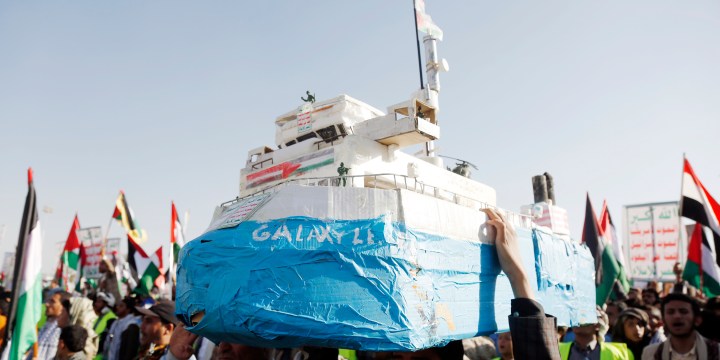MIDDLE EAST CRISIS UPDATE: 28 DECEMBER 2023
Houthi attacks, US retaliatory strikes in Iraq heighten risk of wider war; Biden, Qatar leader in bid to release Gaza hostages

US strikes on targets in Iraq and fresh attacks by the Houthi movement on shipping in the Red Sea provided the latest warning signs that the war in Gaza risks expanding into a wider conflict destabilising the Middle East.
Israel’s minister for strategic affairs, Ron Dermer, met on Tuesday in Washington with US Secretary of State Antony Blinken and National Security Advisor Jake Sullivan. The discussions, according to a White House official, involved the war itself, efforts to release the hostages in Gaza, limiting civilian casualties and planning a future for the region.
President Joe Biden spoke with the emir of Qatar, Sheikh Tamim bin Hamad Al-Thani, on efforts to gain the release of hostages in Gaza and to bolster humanitarian assistance to the territory, the White House said on Tuesday evening.
Shipping giant Hapag-Lloyd said it would keep its vessels away from the Red Sea even after the launch of a US-led task force to protect the key trade route from militant attacks.
Houthi attacks, US strikes heighten risk of wider Mideast war
US strikes on targets in Iraq and fresh attacks by Houthi militants on shipping in the Red Sea provided the latest warning signs that the war in Gaza risks expanding into a wider conflict destabilising the Middle East.
The Pentagon said late on Monday that its forces launched strikes on three installations in Iraq linked to Kataib Hezbollah. Washington said the Iraqi insurgent group that’s backed by Iran was behind an attack that injured three US personnel, leaving one in critical condition.
“While we do not seek to escalate conflict in the region, we are committed and fully prepared to take further necessary measures to protect our people and our facilities,” Defense Secretary Lloyd Austin said. He called it a “necessary and proportionate” response.
Then on Tuesday, Yemen-based Houthi rebels, also backed by Iran, renewed their attacks on shipping in the Red Sea. MSC Mediterranean Shipping Co. confirmed that the container ship MSC United VIII was hit while en route to Pakistan. It said no injuries were reported.
And US Central Command said in a social media posting on X that a US destroyer and F/A-18 fighter jets shot down 12 attack drones, three anti-ship ballistic missiles and two land attack cruise missiles fired by the Houthis over the Southern Red Sea on Tuesday. It said there was no damage to ships or reported injuries.
Although Iran has denied helping militants attack commercial ships, the Islamic Republic has vowed that Israel will pay a price for an airstrike in Syria on Monday that killed a senior commander of its Revolutionary Guard.
“Clearly, the longer the Israeli-Hamas war goes on with this sort of kinetic intensity, the more likely there would be some escalation,” said Aaron David Miller, a senior fellow at the Carnegie Endowment for International Peace and a former US official who has advised secretaries of state on the Middle East.
The attacks, and other developments around the region, highlight an increasingly difficult balancing act for the Biden administration, which is trying to support Israel in its battle against the militant group Hamas, which killed 1,200 Israelis on 7 October and took more than 200 hostages. Hamas has been designated a terrorist organisation by the US and the European Union.
The US has deployed aircraft carrier strike groups to deter Iran-backed forces in the region from striking Israel as it pursues an increasingly deadly ground war in densely populated urban areas in Gaza. But US officials also have put pressure on Israel to wind down its high-intensity operations in Gaza, which have killed about 20,000, according to the Hamas-run health ministry.
For Israeli officials worried about Hezbollah militants in neighbouring Lebanon and other groups in the region, the current conflict already looks like the wider war the US says it’s trying to prevent.
Israeli Defense Minister Yoav Gallant said in the Knesset that Israel was in the midst of a “multifront war,” having already been attacked from seven different arenas — Gaza, Lebanon, Syria, the West Bank, Iraq, Yemen and Iran.
“We have already taken action against six of these seven, and I will say now in the clearest manner possible, that anyone who takes action against us will become a potential target,” he told the foreign affairs and defence committee. “There will be no immunity for anyone.”
Shipper Hapag-Lloyd says Red Sea route still too dangerous
Shipping giant Hapag-Lloyd said it would keep its vessels away from the Red Sea even after the launch of a US-led task force to protect the key trade route from militant attacks.
The container liner said it would continue to reroute its vessels via the Cape of Good Hope, a detour of several thousand kilometres. It follows a spate of attacks on merchant ships — by Yemeni rebels acting in support of the Palestinians — on a route that handles about 12% of global trade.
The incidents have struck everything from oil tankers to container vessels, pushing shipowners to avoid the route. That means delays and extra costs that could ultimately hit consumers.
Spot rates for container shipping have jumped 26% over the past four weeks and “are likely to remain in a heightened state” as long as voyages continue to be diverted, according to a Bloomberg Intelligence research note on Wednesday. Oil prices have risen since the attacks stepped up, though traders are still not pricing in major disruptions.
There’s been little sign of a let-up in attacks in recent days, and a container ship, the MSC United VIII, was hit on Tuesday.
For some companies, the task force has provided reassurance. AP Moller-Maersk, the world’s second-largest container line, said on Wednesday it was preparing to resume shipping through the Red Sea and would deviate from the policy only on a “case-by-case basis”.
Another liner, CMA CGM, said on Tuesday it was devising plans to gradually increase the number of ships it sends through the Suez Canal.
UN names Gaza aid coordinator as Israel rejects automatic visas
United Nations Secretary-General António Guterres named a veteran Dutch politician as senior humanitarian and reconstruction coordinator for Gaza, even as Israel warned it would no longer automatically issue visas for representatives of the world body.
Sigrid Kaag, the outgoing finance minister of the Netherlands, will be responsible for coordinating and monitoring humanitarian relief delivery to the Gaza Strip. She will also establish a UN mechanism to accelerate aid distribution, the secretary-general’s office said. Kaag, who began her career at Shell and who has held other UN positions, is set to take office on 8 January.
Hours before Kaag’s appointment on Tuesday, Israel announced its move to end blanket visa approvals for representatives of the world body. The move followed a refusal by Israel to renew the visa of Lynn Hastings, who was the UN humanitarian coordinator for Palestinians, alleging she refused to condemn Hamas for its 7 October attacks.
Europe gas futures surge on risk of widening war in Middle East
European natural gas futures jumped amid an escalation of the war in Gaza that risks expanding into a wider conflict.
Benchmark contracts traded in the Netherlands rose by as much as 6% early on Wednesday after US strikes on Iraqi targets and fresh attacks by Houthi militants on shipping in the Red Sea added to concerns that the Middle East is getting less stable. Crude oil also gained.
While ship diversions haven’t had a big impact on supplies yet, the market remained on high alert given potential threats to major transit routes for energy exports. Some liquefied natural gas cargoes have been changing course for longer voyages lasting more than a month as they avoid the Red Sea, according to ship-tracking data on Bloomberg.
Still, European gas prices have been trading in a relatively narrow range in recent days and are on course to lose more than 50% for the year. High fuel inventories and relatively muted demand have raised confidence that the continent should pass this heating season comfortably. DM
Read more in Daily Maverick: Israel-Palestine War



















Comments - Please login in order to comment.